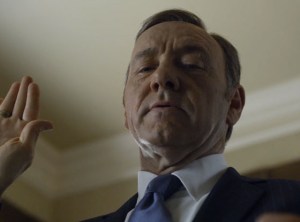
“Dogs are so predictable, aren’t they?” drawls former South Carolina Majority whip Frank Underwood, taking a moment from his favorite pastime — shouting over the fourth wall — to address an actual adversary in House of Cards. Netflix (NFLX) dropped all of 13 episodes as a poisoned Valentine/President’s Day salute on Friday, a dysphoric 8.6 hours of television comprising the second season. It was consumed, Clockwork Orange-style, by politicos, TV-literate junkies, and masochistic media types, demonstrating that we must be very sick people to binge-watch a show presenting the inherent evilness of mankind as the most predictable thing of all.
People are more interested in the narratives of villains than heroes these days. We are told that bad guys like the Joker are more interesting than the Bruce Waynes of the world — that anti-heroes like Breaking Bad‘s Walter White are more compelling than do-gooders who play by the rules. House of Cards is a good reminder, however, that there is a reason Iago wasn’t the center of Othello. Unrelenting, unexplained cruelty can be as pedantic as constant kindness.
House of Cards‘ second season picks up where the first season left off, with Underwood scheming. Now, our protagonist is gunning for the role of Vice President. The things standing in his way are quickly dispatched. (An oblique spoiler: A character is almost literally thrown under a bus for the sake of progressing the narrative of the Underwood’s bloodthirsty claim to the thrown.) If anyone wondered where showrunner Beau Willimon and his writers stood in terms of their audience, the end of the first episode gives you a sardonic wink in the form of birthday cufflinks from Underwood’s loyal bodyguard, Edward Meechum: His employer’s initials, FU.
“Did you miss me?” Frank asks into the mirror. Honestly, we don’t have an answer. We’re dealing with a couple who aren’t repugnant in the same way that some 20-something women find Lena Dunham’s self-involved Hannah Horvath repugnant, because of the queasy Venn Diagrams between the fictional character and their own self-assessment. The Underwoods are so far from relatable that it verges into the nonsensical.
Frank launches a campaign that lasts basically THE ENTIRE SEASON against Raymond Tusk, a businessman with interests in China (who happens to be a very good friend of the President,) for no clear reason other than vague spitefulness and a desire to undermine the establishment in which he’s worked so hard to earn himself a primo position. His wife, Claire, she of the former Mrs. Sean Penn and Princess Buttercup, quickly dispatches a bloodless coup (beyond threatening to let her former partner’s baby “wither and die inside of you,”) in order to resign her position at the nonprofit. Her plotline, played out the rest of the season in a story that mirrors Senator Kirsten Gillibrand’s bill to end military sexual assault, is equally opaque in its motivation. First she is seemingly spurred by a series of random events, but, for the calculations to add up, we must believe the thrust of it was gamed out far in advance.
There is also a delightful subplot involving a cyber hacker with a guinea pig (CASHEW!) played by one of the McPoyle Brothers from It’s Always Sunny in Philadelphia, in basically the same role. This is his online avatar:
It’s by far the funniest WTF-moment in the show. We’d be remiss if we didn’t mention it. This will be the the closest thing you’ll get to a laugh beyond a grim chuckle all season, so be on the lookout.
The problem with the Underwoods is that they’re not the Lannisters (from Game of Thrones), who, though they are selfish and incestuous, at least have a point: to create an order in which their progeny can be kings. Instead, we’re watching a show about the Littlefingers of the world…those undermining courtside confidants whose whispers actually rule the kingdom. You’d think that would be a fun show to watch.
You’d be wrong.


